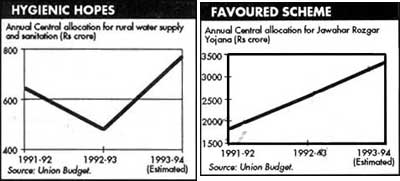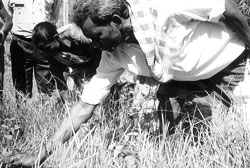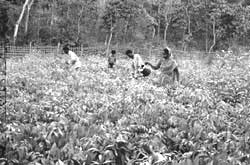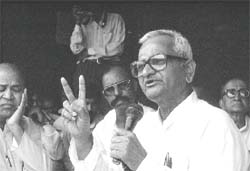INDIA
• Over 80 million children will be lininistered oral polio vaccine on ecember 9 and JImuatT 20, courtesy e Union health ministry, as part of ; plan to make the country free from dioinyelitis
• Over 80 million children will be lininistered oral polio vaccine on ecember 9 and JImuatT 20, courtesy e Union health ministry, as part of ; plan to make the country free from dioinyelitis
<p>Four broad types of studies on rural development and bioenergy technologies are identified. Within these four types, this discussion paper presents a number of existing studies which are most relevant in the context of developing a research focus on the role, feasibility and issues associated with bioenergy, and in particular biofuels, as engine for rural development in developing countries.

Calcutta comes up with the "most efficient and ecologically benign method" of re using municipal waste and sewage
Over 90,000 people residing in several low-lying districts of Gujarat were evacuated due to heavy rainfall which lashed the state this rainy season. Relief Commissioner B P Meena said that the water
In an effort to help deve loping countries compete more effectively in the world starch markets, the United Nations Food and Agriculture Organisation (FAO) has urged research institutes to study
The new buzzword in the climate research circles is vulnerability and adaptation. Just like most of the climate discussion the words have become so dense, that their meaning is lost on most, except

The people of Kalahandi may have survived droughts and floods. But they see little hope in their battle against exploitation

After successive reductions, can increased allocations for rural development, agriculture, education and health be effective?

Factors that contribute to Asia’s continuing environmental imbalances

Six years ago, the Andhra Pradesh government decided to manage forests jointly with the people. This effort is breaking new ground in Naxalite infested areas of the state

Is the UPA government on social overdrive?
in a bid to stop pilferage in the Targeted Public Distribution System (tpds), the Union government plans to introduce food coupons for people below poverty line (bpl). Under the scheme
At Gandhiji's suggestion, Kumarappa undertook a survey of an area in Gujarat that was once most prosperous but had become prey to poverty and famine.
A happy picture painted by a recent FAO report gives way to grim realities about global food situation
<p><strong>As many as 7.95 million Nepalis still defecate in the open such as bushes and field, according to a study conducted by the Department of Water, Supply and Sanitation. Read more in November 2014 edition of the Monthly Overview on State of Environment, Nepal.</strong></p>
A bag full of surprises: Madhya Pradesh Finance Minister Raghavji arrives at the Vidhan Sabha in Bhopal to present the State Budget on Wednesday. Finance Minister Raghavji on Wednesday presented in the State Assembly the Madhya Pradesh Budget for 2008-09 with a budgetary deficit of Rs.91.43 crore. The Minister announced a reduction in entry tax on raw material inputs for textile industry and removal of entry tax on sponge iron and iron scrap for induction furnace. He also announced a reduction in VAT on diesel from 26 per cent to 25 per cent. Mr. Raghavji went on to announce pension and medical facilities to those detained under the dreaded MISA (Maintenance of Internal Security Act) during the infamous Emergency. Those who served six months or more behind bars would get Rs.6,000 per month as "Loknayak Jayaprakash Samman Nidhi' (monthly pension) while there would be a pension of Rs.3,000 for those jailed for more than three months but less than six months. One of the major budgetary announcements was that wheat would be available to each BPL family at the rate of Rs.3 per kg and rice at Rs.4.50 per kg . The budget for 2008-09 has a revenue surplus of Rs.2839.78 crore and the fiscal deficit for year is estimated at Rs.4741.00 crore, which is 3 per cent of the GSDP. The Finance Minister told media persons later that one of the important goals was to focus attention on gender budgeting to ensure equality for women, economic empowerment and women's participation in developmental schemes covered by 21 State departments. The Budget provides Rs.1371.47 crore for Energy, Rs.1656 crore for construction of roads and Rs.484 crore for road maintenance. The Finance Minister incorporated the Chief Minister's recent announcements at a Kisan Mahapanchayat here and told the House that there would be budgetary provision for a bonus of Rs.100 per quintal of wheat procured by government agencies for the public distribution system, reduction in rate of interest from 7 per cent to 5 per cent on short-term agriculture loans, relief in payment of old outstanding electricity bills, and increase in the rate of grant from 10 per cent to 30 per cent on drip/sprinkler irrigation. Mr. Raghavji said that additional irrigation capacity for 4.80 lakh hectare had been created in last four-year period and for the next fiscal, there would be a provision of Rs.1815.57 crore for irrigation purpose. He said colleges of excellence would be set up in each of the 38 backward districts. He also told the House that 254 girls' hostels would be constructed and 448 middle schools would be upgraded to the high school level. The Government would also be launching several scholarships for students belonging to the weaker sections, he added. The Finance Minister told the House that there was provision of Rs.566.88 crore (State share) for creation of employment in rural areas, Rs.100 crore for the District Poverty Initiative Programme Phase-II and Rs.93.23 crore for Rural Livelihood Project. He said the State employees would get dearness allowance and dearness relief at the rate of 4 per cent from this coming April 1 onward.

A rural organisation breathes life into the listless people of Melaghar village
Add value to your agricultural produce if you want to survive in the globalised market. Countries with inefficient agro-industries are likely to be left behind those with modern and efficient agroindustries. While high-income countries add, on an average, $180 of value by processing one tonne of agricultural products, developing countries generate only $40 of value per tonne. This is the starting theme of a global conference to be held in India in April. India will host the first global conference on agro-industries, to be held in New Delhi from April 8 to April 11. Prime Minister Manmohan Singh will inaugurate the forum along with director-general of UN Food and Agriculture Organisation (FAO), Jacques Diouf, United Nations Industrial Development Organisation (UNIDO) director-general, Kandeh K. Yumkella and Inter national Fund for Agricultural Development (IFAD), president, Lennart Bage on April 9. The conference is jointly organised by the FAO, the UNIDO and the IFAD, in close collaboration with the government of India. The Global Agro-Industries Forum will promote the importance of agro-industries for economic development and poverty reduction. Around 500 senior representatives from the agro-industry, governments, technical and financing institutions, civil society and United Nations agencies will discuss the potential of agro-industries and the challenges they are facing. Increasing the market opportunities, particularly for smallscale producers in rural areas, by improving their production, processing and marketing capabilities, will be one of the main issues of the conference. Delivering better products at lower prices could be beneficial for poor consumers and could also create employment opportunities. The Forum will also encourage dialogue between the private and public sector in order to foster partnerships for developing competitive agroindustries. Rapid globalisation, market liberalisation, and urbanisation have created new opportunities for countries to trade agricultural and food products. However, they have also created challenges and increased risks.
Electricity is a key ingredient of socio-economic development of the country. Adequate and reliable supply of electricity is an important pre-requisite for attracting both domestic and foreign investment.

A quarter of a century ago, a jeep driver decided it was time to make a change. Ralegan Siddhi, made into a model village by Anna Hazare, faces challenges of a different kind today